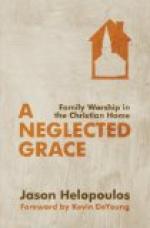And oh, how glorious will be this reward when all the members shall meet again in heaven, recognize each other there, and unite their harps and voices in ascriptions of praise to God. There in that better home, where no separations take place, no trials are endured, no sorrows felt, no tears shed, they shall enjoy the complete fulfillment of divine promises. Heaven, with its unfading treasures, with its golden streets, with its crowns of glory, with its unspeakable joys, with its river of life, and with its anthems of praise, will be their great recompense of the reward. How the anticipation of this should stimulate Christian parents to increased fidelity; oh, what a happy meeting will that be, when husband and wife, parent and child, brother and sister, after many long years of separation, shall great each other in that glorious world, and feel that parting grief shall weep no more!
“Oh! when a mother meets on high,
The child she lost in infancy;
Hath she not then for pains and fears,
The day of woe, the watchful
night,
For all her sorrows, all her tears,
An over-payment of delight?”
With these gracious promises of reward sounding in their ears, Christian parents should never despair; neither should they doubt for a moment the fidelity of God to all his promises. It is true that His promises are conditional, and their fulfillment depends upon the parent’s performance of his part as the condition, yet to every duty he has attached a promise; and wherever He has made a promise for us, he has given us the ability to use the means of securing its fulfillment; and as soon as their conditions are thus met, they become absolute. “Train up a child in the way he should go.” Here is the duty. “And when he grows old he will not depart from it.” Here is the promise. The condition is, that you discharge the duty. If you do so, the promise becomes absolute, and shall with certainty be divinely fulfilled in your child, though the time and manner of this fulfillment may not meet your expectations.
But some may object to this position, and remind us that pious parents are known to have ungodly children who died in their sins. They may refer us to the case of Absalom, and to the sons of Eli. In reply we would state that this is begging the question. It is here taken for granted that these pious parents did fulfill the conditions attached to the above promises. This is a mere assumption; for Absalom was not properly trained; and both he and the sons of Levi, were ruined by the misguided fondness and extreme indulgence of their parents. And thus also does the foolish partiality of many pious parents prevent their fidelity to their children. We must not think that all pious parents are faithful to their duty to their children. The above objection, however, assumes this ground; and, therefore, it is not valid. It is often said that the children of ministers and pious parents are usually more wicked than other children. This is false. The opposite is true. We admit, some have bad children; but it is the fault of the parents; not because God does not fulfill His covenant promises to His people. His people, in these instances, do not meet the conditions upon which His promises are made absolute.




